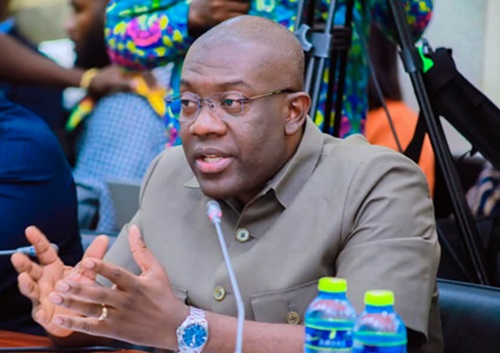The Minority in Parliament is demanding the immediate withdrawal of the controversial eight per cent levy on petroleum products and urging the government to initiate broad-based stakeholder consultations before introducing such a burdensome tax measure.
Addressing a press conference in Parliament yesterday, the Ranking Member on the Economy and Development Committee, Kojo Oppong Nkrumah, accused government of unilaterally imposing the fuel levy without any public engagement, parliamentary transparency, or stakeholder involvement.
The levy, which translates into approximately GH¢1 extra per litre of fuel, has already sparked backlash from petroleum industry players and civil society organisations.
“This levy was smuggled into Parliament late in the day, through a one-page addendum that was not captured in the day’s order paper and not discussed at the Business Committee level,” Mr Oppong Nkrumah told reporters.
“It was rushed through under a certificate of urgency without public input, stakeholder consultation, or even proper parliamentary debate.”
He described the government’s approach as “disingenuous, sneaky, and completely undemocratic,” cautioning that the policy could further aggravate the already high cost of living in the country.
Withdrawal and dialogue
The Minority’s primary demand is that government withdraw the fuel levy and return to the table to consult key stakeholders, including transport unions, consumer associations, the Chamber of Bulk Oil Distributors, and other civil society organisations.
“We believe there are more sustainable and less punitive ways to address the energy sector challenges without punishing ordinary Ghanaians.”
He emphasised that policy decisions of such magnitude especially those affecting millions of Ghanaians and with direct implications for fuel prices, food costs, and inflation must be preceded by adequate dialogue and consensus-building.
Confusion
The Ofoase Ayirebi legislator said adding to the concerns was government’s mixed messaging on the purpose of the levy.
While some officials have argued that it is meant to pay down energy sector debts, others have suggested it is needed to procure fuel and support the energy sector’s operational efficiency.
“The narrative keeps shifting. One moment they say it’s to pay down legacy debt, the next they say it’s to support fuel procurement.
Which is it?” Oppong Nkrumah quizzed.
The Minority argued that the expected GH¢9 billion revenue from the levy over the next 18 months is insufficient to tackle the estimated GH¢80 billion in energy sector liabilities and will instead become a permanent burden on consumers.
Impact on the poor and working class
He said the eight per cent levy applies to every litre of petroleum products purchased at the pump, making it a regressive tax that disproportionately affects the poor and working class.
Mr Oppong Nkrumah pointed out that for every gallon of fuel, Ghanaians are paying about GH¢4.50 more—a significant increase at a time when inflation remains high and real wages have stagnated.
“Transport fares will rise. Food prices will rise. Every item that is transported across the country will become more expensive.
And all this is happening without any attempt to cushion the average Ghanaian,” he said.
Comparing the levy to the now-defunct E-Levy introduced under the NPP, the Minority noted that the E-Levy had a lower rate (1%), included exemptions for the vulnerable, and underwent months of public consultation.
“This fuel levy, in contrast, was rushed, harsh, and silent,” Mr Oppong Nkrumah emphasised.
Alternative proposals
In place of the levy, the Minority is proposing a renegotiation of Power Purchase Agreements (PPAs), reduction in technical and commercial losses in the electricity distribution system, especially through ECG and GRIDCo and a faster transition to renewable energy, particularly solar.
“These are not new ideas, but they are more sustainable and equitable,” said the Ofoase Ayirebi MP.
“We urge government to adopt a strategic approach, rather than burden the ordinary citizen.”
They concluded by cautioning the government that if it insists on implementing the fuel levy without stakeholder engagement, the Minority will mobilise nationwide resistance with civil society groups and affected sectors.

